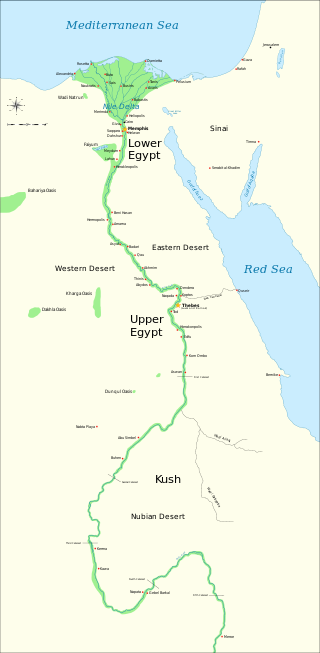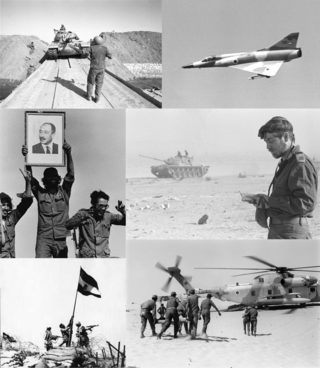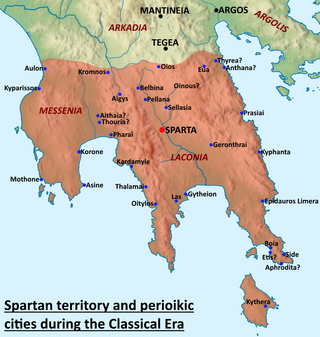| |||||||||||||||||
| |||||||||||||||||
| |||||||||||||||||
Parliamentary elections were held in Egypt in March 1942. [1] They were boycotted by the opposition, resulting in the ruling Wafd Party winning 240 of the 264 seats. [1]
| |||||||||||||||||
| |||||||||||||||||
| |||||||||||||||||
Parliamentary elections were held in Egypt in March 1942. [1] They were boycotted by the opposition, resulting in the ruling Wafd Party winning 240 of the 264 seats. [1]
 | |||
|---|---|---|---|
| Party | Seats | +/– | |
| Wafd Party | 240 | +71 | |
| Liberal Constitutional Party | 4 | –13 | |
| National Party | 2 | –2 | |
| Saadist Institutional Party | 1 | New | |
| Independents | 17 | –25 | |
| Total | 264 | +32 | |
| Source: Sternberger et al. | |||

Ancient Egypt was a civilization of ancient Northeast Africa. It was concentrated along the lower reaches of the Nile River, situated in the place that is now the country Egypt. Ancient Egyptian civilization followed prehistoric Egypt and coalesced around 3100 BC with the political unification of Upper and Lower Egypt under Menes. The history of ancient Egypt unfolded as a series of stable kingdoms interspersed by periods of relative instability known as "Intermediate Periods". The various kingdoms fall into one of three categories: the Old Kingdom of the Early Bronze Age, the Middle Kingdom of the Middle Bronze Age, or the New Kingdom of the Late Bronze Age.

Auschwitz concentration camp was a complex of over 40 concentration and extermination camps operated by Nazi Germany in occupied Poland during World War II and the Holocaust. It consisted of Auschwitz I, the main camp (Stammlager) in Oświęcim; Auschwitz II-Birkenau, a concentration and extermination camp with gas chambers; Auschwitz III-Monowitz, a labour camp for the chemical conglomerate IG Farben; and dozens of subcamps. The camps became a major site of the Nazis' Final Solution to the Jewish question.

Nazi Germany, officially known as the German Reich and later the Greater German Reich, is a term used to describe the German state between 1933 and 1945, when Adolf Hitler and the Nazi Party controlled the country, transforming it into a totalitarian dictatorship. The Third Reich, meaning "Third Realm" or "Third Empire", referred to the Nazi claim that Nazi Germany was the successor to the earlier Holy Roman Empire (800–1806) and German Empire (1871–1918). The Third Reich, which the Nazis referred to as the Thousand-Year Reich, ended in May 1945, after only 12 years, when the Allies defeated Germany and entered the capital, Berlin, ending World War II in Europe.

The Nazi Party, officially the National Socialist German Workers' Party, was a far-right political party in Germany active between 1920 and 1945 that created and supported the ideology of Nazism. Its precursor, the German Workers' Party, existed from 1919 to 1920. The Nazi Party emerged from the extremist German nationalist, racist and populist Freikorps paramilitary culture, which fought against communist uprisings in post–World War I Germany. The party was created to draw workers away from communism and into völkisch nationalism. Initially, Nazi political strategy focused on anti–big business, anti-bourgeois, and anti-capitalist rhetoric; it was later downplayed to gain the support of business leaders. By the 1930s, the party's main focus shifted to antisemitic and anti-Marxist themes. The party had little popular support until the Great Depression, when worsening living standards and widespread unemployment drove Germans into political extremism.

The Schutzstaffel was a major paramilitary organisation under Adolf Hitler and the Nazi Party in Nazi Germany, and later throughout German-occupied Europe during World War II.

The Summer Olympic Games, also known as the Games of the Olympiad, and often referred to as the Summer Olympics, is a major international multi-sport event normally held once every four years on leap years. The inaugural Games took place in 1896 in Athens, Greece, and the most recent Games were held in 2021 in Tokyo, Japan. The International Olympic Committee (IOC) is responsible for organising the Games and for overseeing the host city's preparations. The tradition of awarding medals began in 1904; in each Olympic event, gold medals are awarded for first place, silver medals for second place, and bronze medals for third place. The Winter Olympic Games were created out of the success of the Summer Olympic Games, which are regarded as the largest and most prestigious multi-sport international event in the world.

Samurai were the hereditary military nobility and officer caste of medieval and early-modern Japan from the late 12th century until their abolition in the late 1870s during the Meiji era. They were the well-paid retainers of the daimyo, the great feudal landholders. They had high prestige and special privileges.

The Six-Day War or June War, also known as the 1967 Arab–Israeli War or Third Arab–Israeli War, was fought between Israel and a coalition of Arab states from 5 to 10 June 1967.

The Troubles were an ethno-nationalist conflict in Northern Ireland that lasted for about 30 years from the late 1960s to 1998. Also known internationally as the Northern Ireland conflict, it is sometimes described as an "irregular war" or "low-level war". The conflict began in the late 1960s and is usually deemed to have ended with the Good Friday Agreement of 1998. Although the Troubles mostly took place in Northern Ireland, at times violence spilled over into parts of the Republic of Ireland, England, and mainland Europe.

The Yom Kippur War, also known as the Ramadan War, the October War, the 1973 Arab–Israeli War, or the Fourth Arab–Israeli War, was an armed conflict fought from 6 to 25 October 1973, between Israel and a coalition of Arab states led by Egypt and Syria. The majority of combat between the two sides took place in the Sinai Peninsula and the Golan Heights—both of which had been occupied by Israel in 1967—with some fighting in African Egypt and northern Israel. Egypt's initial objective in the war was to seize a foothold on the eastern bank of the Suez Canal and subsequently leverage these gains to negotiate the return of the rest of the Israeli-occupied Sinai Peninsula.

Sparta was a prominent city-state in Laconia in ancient Greece. In antiquity, the city-state was known as Lacedaemon, while the name Sparta referred to its main settlement on the banks of the Eurotas River in the Eurotas valley of Laconia, in south-eastern Peloponnese. Around 650 BC, it rose to become the dominant military land-power in ancient Greece.

The Tokugawa shogunate, also known as the Edo shogunate, was the military government of Japan during the Edo period from 1603 to 1868.

The Armenian genocide was the systematic destruction of the Armenian people and identity in the Ottoman Empire during World War I. Spearheaded by the ruling Committee of Union and Progress (CUP), it was implemented primarily through the mass murder of around one million Armenians during death marches to the Syrian Desert and the forced Islamization of others, primarily women and children.

Unit 731, short for Manchu Detachment 731 and also known as the Kamo Detachment and the Ishii Unit, was a covert biological and chemical warfare research and development unit of the Imperial Japanese Army that engaged in lethal human experimentation and biological weapons manufacturing during the Second Sino-Japanese War (1937–1945) and World War II. Estimates vary as to how many were killed. Between 1936 to 1945, roughly 14,000 victims were murdered in Unit 731. An estimate of at least 300,000 individuals are estimated to have died to infectious illnesses caused by the activities of Unit 731 and its affiliated research facilities. It was based in the Pingfang district of Harbin, the largest city in the Japanese puppet state of Manchukuo and had active branch offices throughout China and Southeast Asia.

The Normandy landings were the landing operations and associated airborne operations on Tuesday, 6 June 1944 of the Allied invasion of Normandy in Operation Overlord during World War II. Codenamed Operation Neptune and often referred to as D-Day, it is the largest seaborne invasion in history. The operation began the liberation of France, and the rest of Western Europe, and laid the foundations of the Allied victory on the Western Front.

India is a federal union comprising 28 states and 8 union territories, for a total of 36 entities. The states and union territories are further subdivided into districts and smaller administrative divisions.

In modern historiography, ancient Rome encompasses the founding of the Italian city of Rome in the 8th century BC, the Roman Kingdom, Roman Republic, Roman Empire, and the collapse of the Western Roman Empire in the 5th century AD.

The Indian Rebellion of 1857 was a major uprising in India in 1857–58 against the rule of the British East India Company, which functioned as a sovereign power on behalf of the British Crown. The rebellion began on 10 May 1857 in the form of a mutiny of sepoys of the company's army in the garrison town of Meerut, 40 mi (64 km) northeast of Delhi. It then erupted into other mutinies and civilian rebellions chiefly in the upper Gangetic plain and central India, though incidents of revolt also occurred farther north and east. The rebellion posed a military threat to British power in that region, and was contained only with the rebels' defeat in Gwalior on 20 June 1858. On 1 November 1858, the British granted amnesty to all rebels not involved in murder, though they did not declare the hostilities to have formally ended until 8 July 1859.

Apartheid was a system of institutionalised racial segregation that existed in South Africa and South West Africa from 1948 to the early 1990s. Apartheid was characterised by an authoritarian political culture based on baasskap, which ensured that South Africa was dominated politically, socially, and economically by the nation's minority white population. In this minoritarian system, there was social stratification, where white citizens had the highest status, followed by Indians and Coloureds, then Black Africans. The economic legacy and social effects of apartheid continue to the present day, particularly inequality.

RMS Titanic was a British ocean liner that sank on 15 April 1912 as a result of striking an iceberg on her maiden voyage from Southampton, England to New York City, United States. Of the estimated 2,224 passengers and crew aboard, 1,496 died, making the incident the deadliest sinking of a single ship at the time. Titanic, operated by the White Star Line, carried some of the wealthiest people in the world, as well as hundreds of emigrants from the British Isles, Scandinavia, and elsewhere in Europe who were seeking a new life in the United States and Canada. The disaster drew public attention, spurred major changes in maritime safety regulations, and inspired a lasting legacy in popular culture.